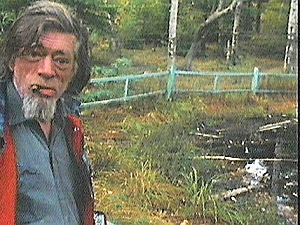"Isn't it wonderful what they are doing in china," He sez one drunken afternoon at Grossman's. I don't think they have taverns in China I said which confounded him for a minute but we soon broke into song "We'll rant and we'll roar like true Newfoundlanders!.
Xmas on the Carleton Streetcar. People everywhere carry armfuls of presents. Milton appears looks straight in to my eyes, "They are starving on the streets!"
I am at the Club 22 trying to produce a movie. I go out for some cigars and run into Milton and invite him in for a drink. He shows me his poker chip that he must break, he is on the wagon. Ok a coffee and I bring him in to my table of suits. Ad men and movie men. I introduce Milton and order coffee. The suits are confused at Miltons crumpled and unshaven appearance and my obvious deference to him. Finally one asks him. Milton What do you do?
"I am a latent science fiction reader.' says Milton. They asked no more. When I stopped laughing I explained he was one
of Canada's Premier poets.
The last time I saw him was about 1982. I said hello to him walking up Spadina. He looked into my face wildly trying to recognize me. "You are killing the fetuses of the working class!" he raged. I guess he thought I was Henry Morgentaler. Milton Acorn
Milton Acorn is one of Canada's most unfortunately unstudied poets. He wrote down-to-earth words in an original way. He was quoted as saying to an auditorium of schoolkids, "To be a poet in this country, you had to be a tough bastard". "I've Tasted My Blood" was his "trademark" poem.
He took a lot of inspiration from another Canadian poet cut from the same cloth, Archibald Lampman, born sixty years before him. They were both relatively unrecognized in their own lifetimes, and each active in socialist causes. Joyce Wayne wrote: "If Lampman was a hot-house flower, Acorn was a bull in a china shop. Both were too good to be ignored; both were too weird to have tea with".
Milton Acorn was born in Prince Edward Island in 1923. He suffered a severe head injury in World War II, and collected a military pension for the rest of his life. In poverty, he took up carpentry in his home province, but eventually drifted to Montreal and became friends with poets Al Purdy and Irving Layton. He had a strong social conscience. He joined the Communist Party, leaving it after the Soviet invasion of Hungary in 1956.
He was married to prominent Canadian poet Gwendolyn MacEwen in Toronto for less than a year in the early 1960's. Acorn moved to Vancouver, where he co-founded the popular newspaper "The Georgia Strait". The American Black Mountain movement in poetry took the province by storm, though, and Milton Acorn was a committed Canadian nationalist and so couldn't appreciate the style. He was forced to return to Toronto in the late 1960's.
He spent the last 15 years of his life in Toronto's Waverly Hotel. This rather suspect edifice still stands at the corner of Spadina and College, right next to the Scott Mission (for men), a place of hard life. He lived to the age of 63, and died on August 20th, 1986.
In 1988, Joyce Wayne had this to say about him:
"He left behind him the most original verse written in this country since the poetry of Archibald Lampman, his nineteenth-century doppelganger.
His great gift was to share a tune; and even if he was never asked to give a command performance, he was the People's Poet. When I've tasted My Own Blood was not awarded the Governor General's Award in 1970, Al Purdy, Irving Layton, Margaret Atwood Eli Mandel and others presented him with a silver-grey medal on a violet-velvet ribbon inscribed "Milton Acorn, the People's Poet"...
Feverishly, Acorn threw himself into the role of People's Poet as the opera of his life played itself out. By the time he did win the Governor General's Award for the Island Means Minago in 1975, he was delighted, but remained unchanged. Far from the cultural mainstream, he found his special place at the centre of the Canadian psyche.
With an authentic working-class voice, Acorn's poetry reflected the uncanny ability to replicate the nuance and cadence of everyday speech so that the delicacy of his imagery is also fraught with the wrath of hardship.
His generosity was astonishing; his pig-headedness outrageous... When a studious young man volunteered to copyedit manuscripts for Steel Rail (a publishing house he helped set up), Acorn inexplicably accused him of being a CIA agent and pinned him squirming to the wall until he vowed never to return.
Acorn was the naughty, precocious child inside each of us. The clenched fist that says no to injustice; the searching eye that spots greed or cruelty; the ringing voice that shouts love "even though it might deafen you"."
Source for text and information: Joyce Wayne, "Shouting


No comments:
Post a Comment